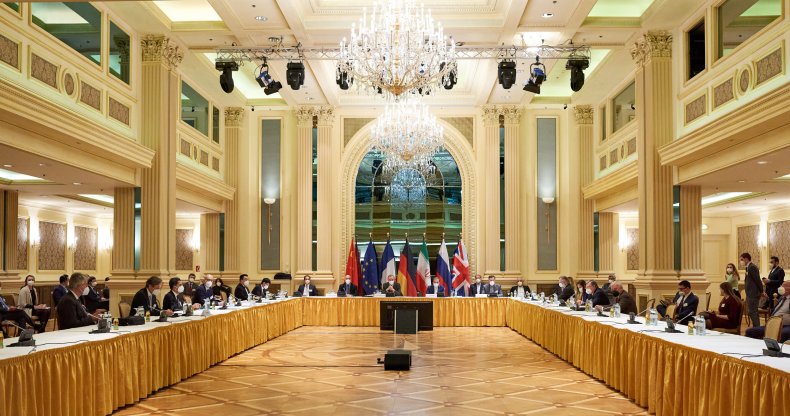Iran Upgrading Its Uranium Enrichment While U.S. Begins Talks to Reenter Nuclear Accord
Iranian officials said they are willing to once again follow the rules set out in the 2015 Iran nuclear deal but first want the U.S. to rejoin the agreement and reverse sanctions put in place during former President Donald Trump's administration.
Trump pulled the U.S. out of the deal, known officially as the Joint Comprehensive Plan of Action (JCPOA), in 2018, after which Iran began violating terms of the agreement in response to new sanctions the U.S. imposed.
The International Atomic Energy Agency said earlier this year that Iran alerted the agency it planned to begin enriching uranium to 20 percent purity, according to an early 2021 report by the BBC.
President Joe Biden said while campaigning last year that he wanted to rejoin the agreement, and The New York Times reported last week that the U.S. and Iran had plans for "indirect" talks about reviving the JCPOA as meetings about the agreement take place among other countries in Vienna this week.
Iranian television stations quoted one of Iran's negotiators as expressing interest in returning to the rules set out in the agreement but said Iran wanted the U.S. to rejoin it first, according to the Associated Press.
A State Department spokesperson described the Vienna meetings in an email to Newsweek as a "healthy step forward." The top issues the spokesperson said would be discussed at the Vienna meetings include how Iran can resume following the rules set out in the 2015 agreement and what the U.S. needs to do in terms of rolling back its sanctions.
The spokesperson added it is unlikely the U.S. will engage in direct talks with Iran during the meetings but said the U.S. "remains open" to doing so.

For more reporting on this story from the Associated Press, see below.
The ultimate goal of the deal is to prevent Iran from developing a nuclear bomb, something it insists it doesn't want to do. Iran now has enough enriched uranium to make a bomb, but nowhere near the amount it had before the nuclear deal was signed.
In the latest announced violation, Behrouz Kamalvandi, a spokesman for Iran's civilian nuclear program, said officials had begun mechanical testing of an IR-9 prototype centrifuge. That centrifuge would enrich uranium 50 times faster than the IR-1s allowed under the accord, he said, according to the semi-official ISNA news agency.
The clock is ticking on trying to get the U.S. back into the deal, with the goal of returning Iran to compliance, with a number of issues to consider.
In late February, Iran began restricting international inspections of its nuclear facilities, but under a last-minute deal worked out during a trip to Tehran by Rafael Grossi, the head of the Vienna-based U.N. atomic watchdog, some access was preserved.
Under the agreement, Iran will no longer share surveillance footage of its nuclear facilities with the IAEA but it has promised to preserve the tapes for three months. It will then hand them over to the IAEA if it is granted sanctions relief. Otherwise, Iran has vowed to erase the recordings, narrowing the window for a diplomatic breakthrough.
Iranian Foreign Minister Mohammad Javad Zarif in March also urged the U.S. to act quickly, noting that as his country's June elections approach, Washington will find itself dealing with a government unable to make progress in the nuclear talks.
In addition, one of the JCPOA's major so-called sunset clauses, a United Nations arms embargo on Iran, expired last year and others are set to expire in the coming years.
The small window for negotiation will make it even more difficult for the U.S. to try to bring new concerns into the deal, such as Iran's regional influence and its ballistic missile program.
Though not taking part in the JCPOA talks, a U.S. delegation headed by the administration's special envoy for Iran, Rob Malley was also in the Austrian capital.
State Department spokesman Ned Price said the delegation was there to hold talks structured around the working groups being formed by the Europeans.
Price said Monday the talks are a "healthy step forward" but added that "we don't anticipate an early or immediate breakthrough, as these discussions, we fully expect, will be difficult."
"We don't anticipate at present that there will be direct talks with Iran," he said. "Though of course we remain open to them. And so we'll have to see how things go."
White House press secretary Jen Psaki said Tuesday there was value to having U.S. diplomats on the ground in Vienna even though they won't be in direct talks with Iran.
"I think it's important to convey to our partners ... that we believe diplomacy is the best step forward," Psaki said.
Zarif on Friday reiterated Iran's position that no additional talks on the JCPOA are needed, since the deal and its parameters have already been negotiated.
"No Iran-US meeting. Unnecessary," he tweeted.
The JCPOA Joint Commission was expected to meet again Friday, and in the meantime, Enrique Mora, the European Union official who chaired the talks, said he would be reaching out individually to all sides.
"As coordinator I will intensively separate contacts here in Vienna with all relevant parties, including U.S.," he tweeted.
U.N. spokesman Stephane Dujarric, asked for Secretary-General Antonio Guterres' reaction to the meetings, said: "We welcome all of these efforts by the JCPOA participants ... to hold constructive dialogue. We hope this is a first step in the right direction."
Updated 4/06 at 6:19 p.m. ET: This article has been updated to include information from a U.S. Department of State spokesperson.

